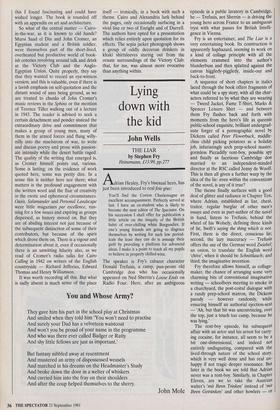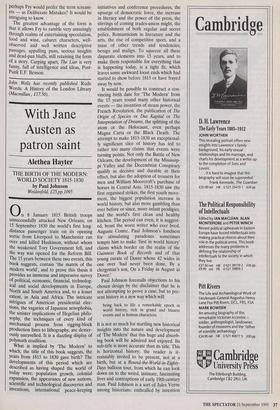Lying down with the kid
John Wells
THE LIAR by Stephen Fry
Heinemann, £13.99, pp.277 Adrian Healey, Fry's bisexual hero, has just been introduced to real foie gras: You'll find the Carton Charlemagne an excellent accompaniment. Perfectly served at last. I have an ex-student who is likely to become the next editor of The Spectator. On his succession I shall offer for publication a little article on the iniquity of the British habit of over-chilling white Burgundies. If one's young friends are going to disgrace themselves by writing for such low period- icals the least they can do is assuage their guilt by providing a platform for advanced ideas. I make it a point to teach all my pupils to believe in properly chilled wine.
The speaker is Fry's cabaret character Donald Trefusis, a camp, pun-prone old Cambridge don who has occasionally appeared on Ned Sherrin's Loose Ends on Radio Four. Here, after an ambiguous
episode in a public lavatory in Cambridge, he — Trefusis, not Sherrin — is driving the young hero across France to an ambiguous tryst with what passes for British Intelli- gence in Vienna.
Fry is an entertainer, and The Liar is a very entertaining book. Its construction is apparently haphazard, seeming to work on a kind of collage principle with all the elements crammed into the author's blunderbuss and then splatted against the canvas higgledy-piggledy, inside-out and back-to-front.
A sequence of short chapters in italics laced through the book offers fragments of what could be a spy story, with all the char- acters referred to by what they are wearing — Tweed Jacket, Fame T-Shirt, Marks & Spencer Leisure Shirt — and between them Fry flashes back and forth with moments from the hero's life as queenie public-school exquisite, brilliant undergrad- uate forger of a pornographic novel by Dickens called Peter Flowerbuck, middle- class child picking potatoes as a holiday job, infuriatingly arch prep-school master, gormless Piccadilly rent-boy, possible spy and finally as facetious Cambridge don married to an independent-minded director at the RSC called Jenny de Woolf. This is then all given a further warp by the idea of the lie: even within the conventions of the novel, is any of it true?
The theme finally surfaces with a good deal of glitter and radiance in Chapter Ten, where Adrian, established as liar, cheat, traitor, regular burglar of other men's essays and even as part-author of the novel in hand, listens to Trefusis, behind the wheel of his Wolsely, defining three kinds of lie, Swift's saying the thing which is not. First, there is the direct, conscious lie; second, the lazy inaccuracy — Trefusis offers the use of the German word Zwiebel; an onion, to translate the English word `chive', when it should be Schnittlauch; and third, the imaginative invention.
Fry therefore allows himself, as collage- maker, the chance of arranging some very charming bits of conventional imaginative writing — schoolboys meeting to smoke in a churchyard, the post-coital dialogue with a randy prep-school matron, the Dickens parody — however randomly, while ensuring himself an authorial ejection-seat — `Ah, but that bit was unconvincing, over the top, just a touch too camp, because he was lying.'
The rent-boy episode, his subsequent affair with an actor and his arrest for carry- ing cocaine, for instance, all seem to be a bit one-dimensional, and indeed not entirely undisgusting, compared with the lived-through nature of the school story, which is very well done and has real un- happy if not tragic deeper resonance. But later in the book we are told that Adrian never was a rent-boy. Similarly, in Chapter Eleven, are we to take the Austrian waiter's `mit Ihren Trinken' instead of 'mit Ihren Getrankere and other howlers — or
perhaps Fry would prefer the term scream- ers — as Deliberate Mistakes? It would be intriguing to know.
The greatest advantage of the form is that it allows Fry to ramble very amusingly through realms of entertaining speculation, food and wine, cabaret characters, well- observed and well written descriptive passages, appalling puns, serious insights and dead-pan bluffs, still retaining the form of a story. Carping apart, The Liar is very funny, full of intelligence and ideas, Post- Punk E.F. Benson.
John Wells has recently published Rude Words: A History of the London Library (Macmillan , £17.50).



























































 Previous page
Previous page